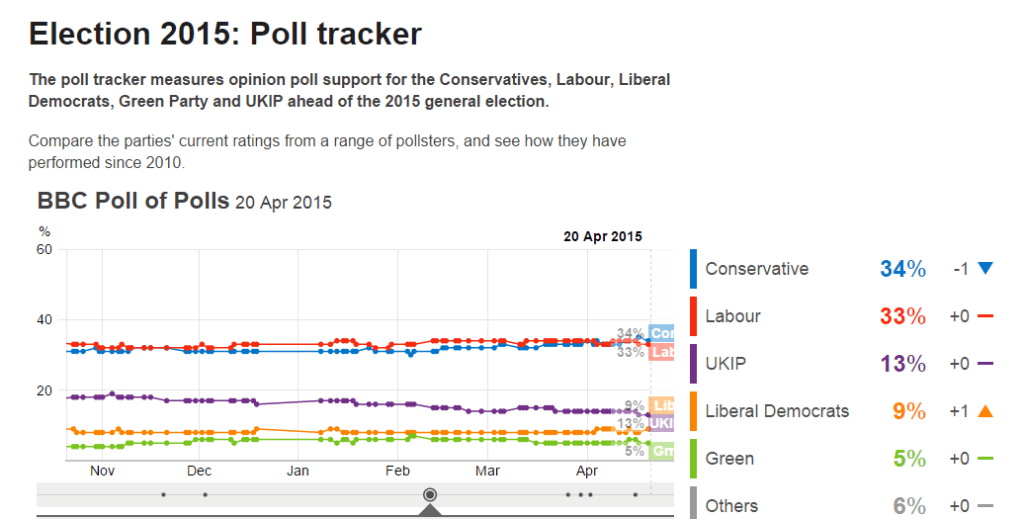I despair. My ambition was to do a weekly survey of important political issues relevant to this election. But after the economy and the NHS there seems to be little actual argument over policies. Housing and immigration do feature prominently in local hustings. But education, the EU, political reform: nobody seems interested. Instead the election news is dominated by Scotland. So that’s what I’ll cover this week.
The proximate cause of the fuss is the rise of the SNP. This surge was first evident in 2011 when they secured a majority in the Scottish Parliament, in spite of its proportional electoral system. But for some reason the Westminster parties did not appreciate the threat. The calculation may have been that unionists would easily win the referendum on Scottish independence which was to follow, and this would deflate the nationalist bubble. But the referendum caught the Scots’ imagination, and made the Westminster parties look flat-footed. The unonists won the referendum, but by a smaller margin than expected, and only through the use of negative tactics. The SNP bubble did not burst; new members flocked in, excited by its offer of hope and optimism.
The Lib Dems in Scotland had long been braced for bad things. Their association with the toxic Tories in Westminster turned a lot of their Scottish supporters off. But a collapse in the Labour vote took that party by surprise. They have offered nothing but negative campaigning and institutional inertia; it should have been no surprise – and it was certainly well-deserved. As a result the SNP seem certain to sweep Scotland on May 7, leaving Westminster with a problem. The party will surely hold the balance of power. and they have said that there is no way that they can support a Conservative government.
A flailing Conservative campaign has seized on this. It is stoking up English (and Welsh) voters with the idea a Labour government would be propped up by the SNP in a “coalition of chaos”. To stop this they are appealing to floating voters, especially those bending towards Ukip, to support the Conservatives to give them an outright majority and show the Scots who’s boss (they don’t actually articulate that last bit). Former Conservative Prime Minister John Major offered the English offered the country a stern warning.
So: what to make of this? My first reaction is exasperation at the Tories. They, more than anybody, and Mr Major, as much as any other leader, have created the situation where Scots and English and Welsh voters have diverged. Margaret Thatcher started it, with no comprehension of Scottish sensitivities. Mrs Thatcher “stole” the North Sea oil to prop up shaky English finances, and then dismantled much of Scotland’s old industry, creating mass unemployment. Well that’s how many Scots saw it, and still do, though whether Scotland would have been better off without her is another matter entirely. The final straw was piloting the hated “Poll Tax” in Scotland with no democratic mandate. Neither she, nor Mr Major, were interested in taking forward constitutional reforms that might give Scottish voters a greater say in their own government. Mr Major was quite passionate about this – he saw devolution as the start of a slippery slope. Well he wasn’t so wrong about that – but I hate to think what the state of Scottish politics would have been without devolution. The fact is that neither he nor Mrs Thatcher understood what was going on north of the border, and still less had any constructive solution. If the Tory brand was less toxic north of the border, the party would be much less isolated now, and the whole situation much more manageable. And if they truly believe in a democratic union, and the legitimacy of Britain’s electoral system (both core Tory beliefs), then they must allow that the SNP’s right to influence the British government is legitimate.
But the Tories are pointing to a real problem. The SNP have been setting out their stall on the UK-wide policies they would support. They want less “austerity” – i.e. more public expenditure unsupported by tax rises. They oppose Britain’s nuclear deterrent. They are also happy to vote on issues in the UK parliament that apply to England only – and in particular the NHS. Their justification for this is that Scottish public funding is based on the so-called “Barnett formula“, which ties it to levels of expenditure in England. The continued use of this formula represents a major strategic failure by the Westminster establishment. Unfortunately the three main Westminster political parties very publicly re-committed to it during the referendum campaign in a panicky “vow” in the last weeks. This gives cover for SNP MPs to make mischief. If only the Westminster politicians had thought about the matter more deeply, they could have found an escape route under the guise of giving Scotland more autonomy. But instead they simply put the matter on the “too difficult” pile, in classic Westminster style.
But how would a Labour-SNP partnership at UK level work out? The first point to make is not to underestimate the SNP leadership. Unlike the Westminster parties, they think strategically. They are unlikely to follow the playbook forecast by Mr Major, of demanding impossible things and storming off. A deal on economic policy is well within reach – the SNP vision actually sounds remarkably similar to Labour’s (bring the deficit down gradually; slowly reduce the level of national debt). A vote on the nuclear deterrent could well be engineered. SNP votes on selected English matters might well give the government a bit of stability. But two wider problems beckon.
The first is holding the Labour Party together. Many of the SNP demands will be popular with English and Welsh Labour supporters and MPs. This will exacerbate tension between Labour’s pragmatic leadership and its angry grassroots, its trade union backers, and its local mafias in key strongholds. To make matters worse, the party will be desperate to recover its standing in Scotland, and to fight back against the SNP. This is a toxic mix.
The second is just how SNP influence will play with the English public. The malign British press stand waiting to stoke up resentment. A backlash favouring both Conservatives and Ukip could well arise. This would be a lot worse if Labour has fewer MPs than the Conservatives, and yet are still able to form a minority government, because nobody will work with the Conservatives.
There are two ways that Labour might head off the problem, though. The first they will not like at all: and that is to form a minority coalition with the Liberal Democrats, so that they can securely outgun the Tories, and reduce their dependence on the SNP. They might then dare the SNP to bring this government down – along with some token concessions. This approach has the added advantage of a big block of Lib Dems in the House of Lords – which could be a key battleground for a minority government, but where the SNP are weak.
The second (and not incompatible) way is to quickly form a UK constitutional convention, to promote a package of political reforms for the UK. This is official Labour policy, though it ranks alongside their commitment in 2010 to introduce the Alternative Vote and reform of the House of Lords, both of which they torpedoed subsequently. It is official Labour policy to play for time – but they could start taking it seriously and giving it real political heft. This could, and should, provide cover to replace the Barnett formula, as well as portraying any partnership with the SNP as a stopgap while these bigger issues are dealt with in a properly democratic way.
Both solutions require rather more strategic insight than the Labour leadership has shown to date, however. But personally, I rather prefer the idea of a chaotic period of British parliamentary politics to a period of majority Conservative government. It might at last hasten the political reforms the country badly needs north and south of the border.



